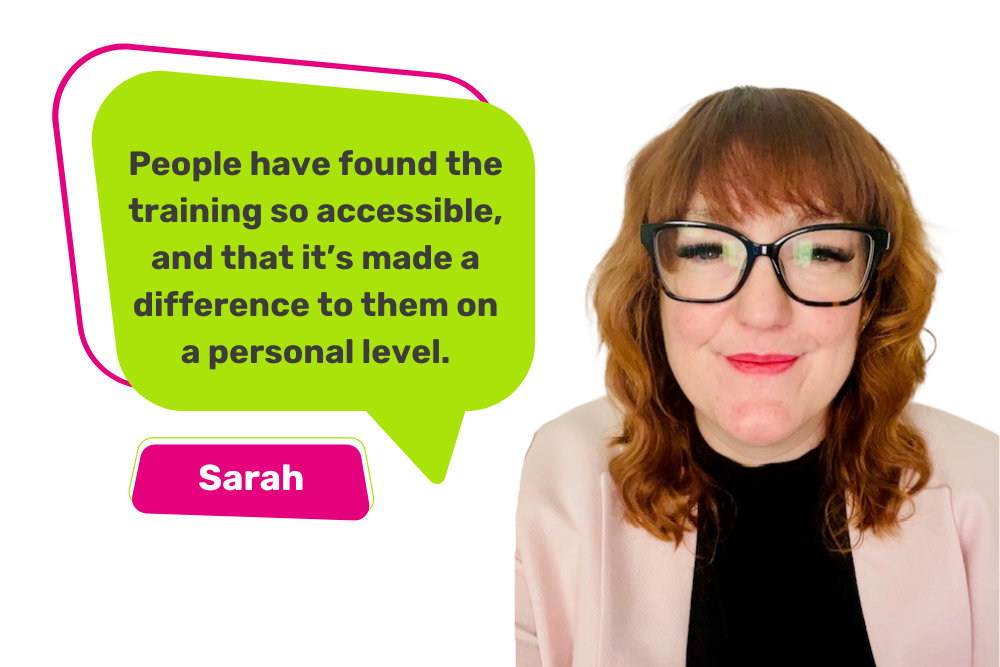Why did you choose National Numeracy to work with on your maths mission?
The charity’s Numeracy Champion training is really good CPD, and it’s fully funded.
I could see that raising awareness for people regionally about what is happening nationally with maths would benefit all of us.
So for me it was essential that we had a relationship, and to make sure we were taking on board those resources and getting involved really early. It's been an asset to our service.
National Numeracy hosted a stakeholder engagement event online for people to find out more about the programme, what it entailed, who it was aimed at and the support on offer. Did you find that beneficial?
Yes – I would 100% recommend for people starting out that they attend. It’s important that they hear it from National Numeracy directly, so they know that we are in partnership, and that this is really valuable.
As you are a nationally recognised organisation, I think that made a difference. And coming to the initial meeting meant they were fully informed about things that were key to them like the length, how to access the training (online), and select their own dates.
The flexibility and clarity made it easy to get people on board.
For me, I included it as part of my contract reviews to find out who had attended and get feedback on the programme from a quality point of view.
What did you think of the Numeracy Champion training?
The clarity beforehand meant the training was exactly what I expected, and it was at the level I expected as well.
I wanted to do it myself so I could be a really good advocate for it.
From a management perspective, I think it’s really important you’re not asking others to do something you’re not willing to do yourself.
It helped me to tailor how I reached people and got them involved. It was really good to see the research from National Numeracy because it confirmed some of the things that we find. It’s good to have that bit of reinforcement that came through the training and the additional webinars.
How did you decide who to train as Numeracy Champions?
It was important to target our Multiply stakeholders, as we do a subcontracted approach in Sheffield.
It was really critical to get organisations who were involved in Multiply, involved from the start.
We needed to get the senior stakeholders involved and then they would cascade it down to their teams. In doing this we managed to get people involved at every level in their organisation.
The flexibility and clarity around the Numeracy Champion training meant it was easy to get people on board, and I’ve encouraged it through my contract management throughout the year. I’m asking for feedback as part of my quality role and overarching contact management.
How did your providers find the training?
Everybody has been really positive about the training! They felt the pitch was at the right level and it wasn’t too time consuming.
I think the success really is that people have found the training so accessible and that it's made a difference to them on a personal level.
It’s really supported the project to introduce a new innovative curriculum. It’s helped overcome barriers to teaching maths, and having the resources there has been really useful. For example, we did a cost-of-living workshop for the Job Centre Plus to help with budgeting and one of the things we showed them was the National Numeracy resource around money management.
It’s added value that we’re getting throughout Sheffield.
Have the National Numeracy key resources been helpful?
The resources, including the toolkits once you have done the training, have been really useful. And just being more aware of National Numeracy, the National Numeracy Challenge, and what’s available on the website. With budgeting, we’ve used the Mr MoneyJar tips and videos.
Through us having that partnership and awareness I feel that we have been able to be a good advocate for what National Numeracy are doing as well and share it wide.
Are there any success stories you would like to share?
We’ve had one learner who started off as a Multiply learner, and they’ve now been employed by the subcontracting organisation to support other learners! So they have done the Numeracy Champion training as part of that.
And internally our Functional Skills team and the English tutors have gained personal levels of confidence. From the Numeracy Champion training the English tutors now feel that they can deliver lower-level maths, so they’re embedding it better into the curriculum and that’s been a real success.
99% of learners said that it’s helped their confidence in everyday life with maths and 97% said it’s supported them to overcome barriers.
They understand that they don’t need to be maths specialists to become a Numeracy Champion and that with the training and resources they are in a better position to be able to support maths learning.
Everyone just feels a lot more confident from the training.
We have a large number of volunteers who are not quite in those roles yet, but it’s a stepping stone for them. Helping to mentor someone in the classroom may lead them on to a teaching career.
What is the legacy of Multiply in Sheffield?
Our approach to Multiply has been around a lean, “chunks of learning” model, but what we’ve found is that many of our learners have done 9-12 hours of maths just by doing this. So not just attending one block of learning; they have attended many.
We’re looking at retaining that curriculum methodology and that bite-size model, but also the theme of sustainability. Those themes have been beneficial to people, especially with the cost-of-living crisis.
We had one young mum who took part in four blocks of Multiply learning, but she had never had a certificate from school. She was over the moon with the courses and is now progressing on to do her Functional Skills!
From taking this approach 49% of our learners have progressed onto a further block of Multiply, further learning, including maths or employment.
It’s about getting the right thing, at the right time, for the right person.








